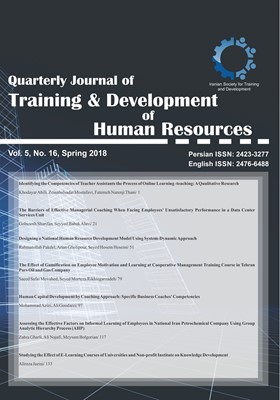Human Capital Development by Coaching Approach: Specific Business Coaches’ Competencies
Subject Areas :
Mohammad Azizi
1
*
![]() ,
Ali Ghodarzi
2
,
Ali Ghodarzi
2
1 - University of Tehran
2 - University of Tehran
Keywords: Human Capital, Specific competencies, business coaching, Business knowledge, Market knowledge,
Abstract :
In recent years, there is growing acceptance of need for educational reform and changes in learning to meet the challenges of business. This study aimed to identify specific competencies of business coaching. The population of this research are specific business coaches working in the ministry of industry, mine and trade that from 231 of samples necessary information was collected. The results showed that indicators such as " deep experience in the field of business", "experience and familiarity with the challenges and help entrepreneurs in bottlenecks and problems", aligning the expertise and experience of the players in the field of activity and needs of entrepreneurs or business owners "component alignment with the business," business information appropriate scope of students' knowledge of transforming ideas into business' financial information and understanding of the business ", "Introduction to the facility on businesses' component business knowledge, "in-depth knowledge of the needs and expectations of customers or target market", knowledge of methods are the most important special competencies for coaches.
1. Crompton BM, Smyrnios KX. What difference does business coaching make to entrepreneurs' firm performance and future growth? InICSB World Conference Proceedings 2011 (p. 1). International Council for Small Business (ICSB).
2. McCracken M, Wallace M. Towards a redefinition of strategic HRD. Journal of European industrial training. 2000; 24(5):281-90.
3. Bellinger G. Systems Thinking. Knowledge Management—Emerging Perspective, 2004.
4. López SP, Peón JM, Ordás CJ. Human resource management as a determining factor in organizational learning. Management Learning. 2006;37(2):215-39.
5. Crompton BM, Smyrnios KX, Bi R. Measuring the influence of business coaching on fast-growth firms. Small Enterprise Research. 2012;19(1):16-31.
6. Koopman RG. Coaching and mentoring entrepreneurs-more definitions won't work. 27nd RENT. 2013.
7. Audet J, Couteret P. Coaching the entrepreneur: features and success factors. Journal of Small Business and Enterprise Development. 2012; 19(3): 515-31.
8. Dolores Vidal-Salazar M, Ferrón-Vílchez V, Cordón-Pozo E. Coaching: an effective practice for business competitiveness. Competitiveness Review: An International Business Journal. 2012; 22(5): 423-33.
9. McCarthy G. Approaches to the postgraduate education of business coaches. Australian Journal of Adult Learning. 2010; 50(2): 323.
10. Trenner L. Business coaching for information professionals: Why it offers such good value for money in today’s economic climate. Business information review. 2013; 30(1): 27-34.
11. Conte SD. Business coaching and the entrepreneur: A well-suited association. Journal of business and entrepreneurship. 2002;14(2):123.
12. Peterson DB. Executive coaching at work: The art of one-on-one change. Consulting Psychology Journal: Practice and Research. 1996; 48(2): 78.
13. Azizi, M., Aghaeipour, A. Developing mentoring programs in Business: the qualified mentee. Journal of Entrepreneurship Development, 2017; 10(2): 279-298. doi: 10.22059/jed.2017.229828.652167
14. Dubois D, Rothwell W. Competency-Based Human Resource Management: Discover a New System for Unleashing the Productive Power of Exemplary Performers. Nicholas Brealey; 2004 Dec 1.
15. Phillips J, Phillips P. High-impact human capital strategy: Addressing the 12 major challenges today's organizations face. Amacom; 2015.
16. Fazel P. Teacher-coach-student coaching model: A vehicle to improve efficiency of adult institution. Procedia-Social and Behavioral Sciences. 2013; 97: 384-91.
17. Devine M, Meyers R, Houssemand C. How can coaching make a positive impact within educational settings? Procedia Social and Behavioral Sciences. 2013; 93: 1382-9.
18. Blackman AC. The effectiveness of business coaching: An empirical analysis of the factors that contribute to successful outcomes (Doctoral dissertation, James Cook University).
19. Catry B. The great pretenders: the magic of luxury goods. Business Strategy Review. 2003;14(3):10-7.
20. Grant AM, Spence GB. Using coaching and positive psychology to promote a flourishing workforce: A model of goal-striving and mental health.
21. Champathes MR. Coaching for performance improvement: The “Coach” model. Development and Learning in Organizations: An International Journal. 2006; 20(2): 17-8.
22. Jones G, Gorell R. 50 top tools for coaching: a complete toolkit for developing and empowering people. Kogan Page Publishers; 2018.
23. Popper M, Lipshitz R. Coaching on leadership. Leadership & Organization Development Journal. 1992;13(7):15-8.
24. Graham S, Wedman JF, Garvin‐Kester B. Manager coaching skills: What makes a good coach? Performance Improvement Quarterly. 1994; 7(2): 81-94.
25. Burchardt C. Business Coaching and Consulting–the Systemic Constellation Approach in Business. InModelling and Management of Engineering Processes 2015 (pp. 101-112). Springer, Berlin, Heidelberg.
26. Wilson C. Best practice in performance coaching: A handbook for leaders, coaches, HR professionals and organizations. Kogan Page Publishers; 2007.
27. Baker KH. Business coaching and leader efficacy development: A comparative study (Doctoral dissertation, Walsh College).
28. Azizi, M., Goodarzi, A. Identifying the key Competencies of Business Coaches. Journal of Entrepreneurship Development, 2016; 9(2): 317-336. doi: 10.22059/jed.2016.60454
29. Stavrou ET, Kleanthous T, Anastasiou T. Leadership personality and firm culture during hereditary transitions in family firms: Model development and empirical investigation. Journal of Small Business Management. 2005; 43(2): 187-206.
30. Ac Competency Framework, Worldwide Association of Business Coaching (2007) https://www.wabccoaches.com/includes/popups/competencies.html.
31. Burtonshaw-Gunn S. Essential tools for management consulting: tools, models and approaches for clients and consultants. John Wiley & Sons; 2010.
32. Azizi, M., Hatami, L. Identifying the key Competencies of Business Counselores. Journal of Career and Organization Counseling, 2016; 25(7): 102-119.
33. Andrews J, Clark R. Peer mentoring works!
34. Clutterbuck D, Lane G. The situational mentor. London: Gower. 2004..
35. paradigm group: http://paradigmgroupcoaching.com/turning-point-coaching-process/

